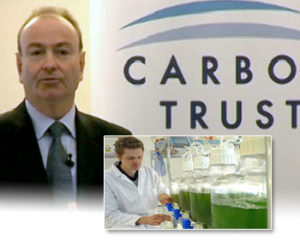
Carbon Trust chief executive Tom Delay said over 70 UK algae scientists are participating in the project.
An elite scientific team drawn from leading research institutions in the UK, are progressing well in a bid to find a successful formula to create low-cost biofuel in vast quantities.
It hopes to develop a system to cultivate and process 70 billion litres of algae biofuel a year, cost effectively and sustainably by 2030.
This will be equivalent to six per cent of road transport diesel and a saving of more than 160 million tonnes of carbon dioxide (CO2) every year.
Working for the UK’s Carbon Trust, the project involves among others, researchers at universities at Newcastle upon Tyne, Manchester, Sheffield and Southampton.
Newcastle University in north-east England in particular is a key player in the eight million-pounds project, having secured more than 750,000 pounds to fund two aspects of the research.
These are led by Dr Adam Harvey, from the School of Chemical Engineering & Advanced Materials, and Dr Gary Caldwell, based in the School of Marine Science & Technology. One will look at algal growth and the other at oil extraction.
Dr Harvey, who is leading the oil extraction project, said: “The trouble with algae is that you have a small amount of it in a vast excess of water – so at the moment we use an awful lot of energy boiling off the water to get to the plant oil.
[ad]
“In fact, the energy used for extraction can outweigh what you get back on combustion of the biofuel. Our aim is to find ways of extracting the oil and converting it to fuel, without having to remove the water.”
Dr Caldwell added: “One of the biggest hurdles to growing algae at a large scale is preventing the plants from dying or being out-competed by unwanted organisms.
“Algae release chemicals into the water to communicate with each other and to fight against disease and predators. We will use these chemicals as a means to control the nature of growth ponds and prevent the algae from dying,” he said.
Funded by the UK government’s Department for Energy & Climate Change, the first step is to screen thousands of species of algae to identify those that can produce large quantities of a substance similar to vegetable oil.
The Newcastle researchers are also developing methods for enabling large-scale production in algae ponds. The Carbon Trust is planning to construct a pilot demonstration plant in an equatorial region where algae are most prolific.
Carbon Trust chief executive Tom Delay said: “We have pulled together a dream team of over 70 UK algae scientists who have the expert knowledge to turn algae into a British biofuel success story.”
High oil prices – along with the threat of exhausted fields leading to further large cost increases in future – as well as competing demands on agricultural resources between foods and other biofuel sources, are creating much more interest in algae farming to produce vegetable oil, biodiesel, bioethanol and other bioproducts.
Producing algae need have no effect on fresh water resources, can be produced using ocean and wastewater and are biodegradable and relatively harmless to the environment if spilled.
As a result, scientists, engineers and potential users in many other countries across the world are devoting considerable resources to the search for economically and environmentally viable methods of algae fuel production on a commercial scale.
Source /image and thanks to fis.com

